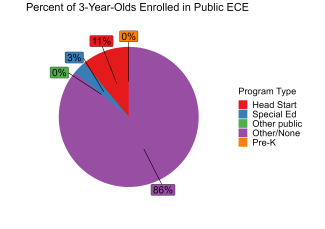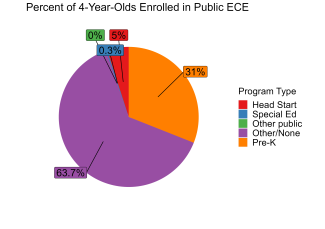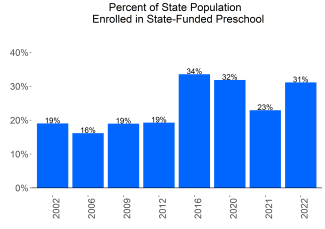
State of Preschool
Michigan
Access Rankings
Resource Rankings
Total Benchmarks Met

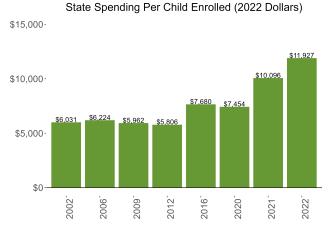
Overview
During the 2021-2022 school year, the Michigan Great Start School Readiness (GSRP) preschool program enrolled 35,895 children, an increase of 9,120 from the prior year, as the program began to recover from the impact of the COVID-19 pandemic. State spending totaled $307,120,000, with an additional $121,000,000 in federal recovery funds to support the program, up $157,801,236 (58%), adjusted for inflation, since last year. State spending per child (including federal recovery funds) equaled $11,927 in 2021-2022, up $1,831 from 2020-2021, adjusted for inflation. Michigan met 10 of 10 quality standards benchmarks.
What's New
The state legislation appropriated $121 million in federal recovery funding to expand GSRP to serve an additional 17,000 to 22,000 eligible children over the next few years with the goal of reaching 90% of 4-year-olds in families at or below 250% FPL. Over time, state funds will replace the federal recovery dollars. The state legislature approved an increase in GSRP per child funding from $7,250 to $8,700 for a full-day slot, matching the base foundation allowance of K–12. The Early Childhood Standards of Quality for Prekindergarten (now Birth through Kindergarten) were updated and approved by the Michigan State Board of Education on November 15, 2022.
The Michigan Department of Education (MDE) received a Preschool Development Grant Birth through Five (PDG B–5) planning grant for $4 million in December 2022 to create workforce and family engagement needs assessments that will be incorporated into Michigan’s Collective Early Childhood Action Plan. MDE and partners will create a family-facing enrollment and eligibility tool and will support the workforce by piloting a competitive wage scale to address critical shortages in the early childhood system.
Background
Established in 1985, the GSRP, formerly known as Michigan School Readiness Program, provides preschool education for at-risk 4-year-olds, and is associated with the state’s early childhood initiative. Starting in 2013-2014, 90% of families had to be at or below 250% FPL with some exceptions for up to 300% FPL. In 2021-2022, up to 15% of children could be over the income threshold, up from 10%. Any family over-income must pay a fee on a locally determined sliding scale unless they are homeless, in foster care, or have an IEP recommending placement in an inclusive preschool setting. GSRP serves the majority of children in school-day programs. Intermediate School Districts (ISDs) serve as program grantees, but they may distribute funds to local school districts and to providers in community-based settings to offer GSRP. GSRP providers must attain a three-star or higher rating in Michigan’s Great Start to Quality tiered rating and improvement system.
Overall ISD funding is determined by the level of poverty in each ISD and a funding formula, with final grantee awards based on both a community needs assessment and a formula component. State funding includes a transportation fund, and funding to recruit families and increase public awareness of GSRP, and $350,000 is appropriated for ongoing statewide evaluation activities.
Michigan’ Developmental Kindergarten (not included in this report) is the first year of a two-year kindergarten program for children who turn 5 between September 2 and December 1 or whose parents and/or schools feel they are “not ready”, usually those with birthdays between July and Sept. 1. It is funded in the same way as kindergarten using the school funding formula and follows kindergarten requirements. DK enrolled 6,580 4-year-olds with $57,246,000 in total spending in 2021-2022.
Michigan Great Start Readiness Program
Access
Resources
| Total state pre-K spending | $428,120,000 |
| Local match required? | No |
| State Head Start spending | $0 |
| State spending per child enrolled | $11,927 |
| All reported spending per child enrolled* | $11,927 |
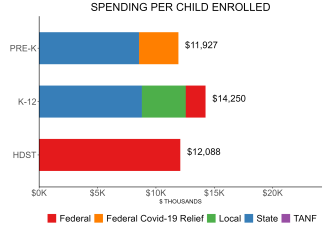
Pre-K programs may receive additional funds from federal or local sources that are not included in this figure. K–12 expenditures include capital spending as well as current operating expenditures. Head Start per-child spending includes funding only for 3- and 4-year-olds.
Michigan Quality Standards Checklist
| Policy | Requirement | Benchmark | Meets Benchmark? |
|---|---|---|---|
For more information about the benchmarks, see the Executive Summary and the Roadmap to State pages. | 10benchmarks met | ||
| Early Learning & Development Standards Benchmark | Comprehensive, aligned, supported, culturally sensitive | Comprehensive, aligned, supported, culturally sensitive | |
| Curriculum Supports Benchmark | Approval process & supports | Approval process & supports | |
| Teacher Degree Benchmark | BA | BA | |
| Teacher Specialized Training Benchmark | ECE, CD, ECE SpEd | Specializing in pre-K | |
| Assistant Teacher Degree Benchmark | CDA or AA in ECE/CD | CDA or equivalent | |
| Staff Professional Development Benchmark | 16 hours/year; PD plans; Coaching | For teachers & assistants: At least 15 hours/year; individual PD plans; coaching | |
| Maximum Class Size Benchmark | 18 (4-year-olds) | 20 or lower | |
| Staff to Child Ratio Benchmark | 1:8 (4-year-olds) | 1:10 or better | |
| Screening & Referral Benchmark | Vision, hearing, health & more | Vision, hearing & health screenings; & referral | |
| Continuous Quality Improvement System Benchmark | Structured classroom observations; Data used for program improvement | Structured classroom observations; data used for program improvement | |
